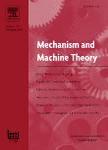版权所有:内蒙古大学图书馆 技术提供:维普资讯• 智图
内蒙古自治区呼和浩特市赛罕区大学西街235号 邮编: 010021

作者机构:Beijing Inst Technol Collaborat Innovat Ctr Elect Vehicles Beijing Beijing 100081 Peoples R China Beijing Inst Technol Natl Engn Lab Elect Vehicles Sch Mech Engn Beijing 100081 Peoples R China
出 版 物:《MECHANISM AND MACHINE THEORY》 (机构学与机械原理)
年 卷 期:2020年第154卷
页 面:104100-104100页
核心收录:
基 金:Ministry of Science and Technology of the People's Republic of China [2017YFB0103600] Beijing Municipal Science and Technology Commission via the Beijing Nova Program [Z201100006820007]
主 题:Adaptive model predictive control Autoregressive with exogenous input (ARX) model Unbiased estimation Yaw stability control
摘 要:In this paper, an adaptive model predictive control (AMPC) scheme with high computational efficiency is developed to improve the yaw stability for four-wheel-independently-actuated electric vehicles (FWIA EVs). A novel vehicle model is first established based on an autoregressive with exogenous input (ARX) model, which is independent of vehicle parameters and road conditions. The time-varying model parameters are identified by an unbiased estimation system via an instrumental variable (IV) method. The AMPC scheme is proposed based on the ARX vehicle model for direct yaw moment control (DYC). Then, a multi-objective optimization method is proposed to optimize torque allocation for yaw stability enhancement. Finally, the performance of the proposed scheme is verified under the double lane change and slalom maneuvers in Carsim. Simulation results show that the ARX-model-based unbiased estimation can effectively follow the reference while filtering out measurement noises. The yaw rate signal is smoother and the computational time is reduced by half under the proposed AMPC scheme in comparison to that under conventional dynamics-model-based MPC. In the meantime, the vehicle slip angle and the steering wheel angle are reduced, which indicates improved vehicle stability. (C) 2020 Elsevier Ltd. All rights reserved.